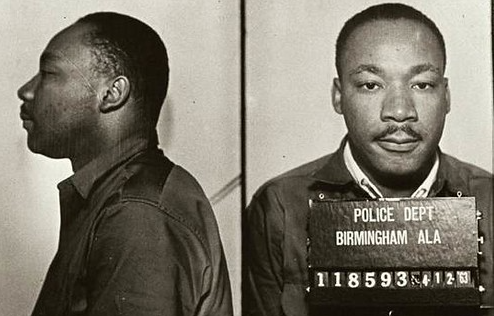60 Years Since MLK’s Letter From a Birmingham Jail

Martin Luther King Jrs. Mugshot in Birmingham Alabama Jail
April 16, 2023
April 16th marks the 60th year since Martin Luther King Jrs. incarceration letter at the Birmingham jail in Birmingham, Alabama in 1963. During his 8 days in jail, the famous “Letter From a Birmingham Jail” was written by Martin Luther King Jr. during his incarceration. This letter was directed towards the clergymen to address his comments on how MLK’s nonviolent campaign was “unwise and untimely” while also labelling Kings nonviolent efforts as “those of an extremist”.
This open letter has became a piece of history and represents the injustice and oppression that African Americans have faced for years through segregation, police brutality, unjust laws, etc. Kings letter is open ended honesty and I believe this is why the letter is so powerful and admirable. King touches on the issues of segregation while also holding an overall society accountable for the direction of the world throughout religion, judicial systems, police forces, etc. He explains his motives behind his nonviolent direct action program as well as the faults of the Just vs. Unjust laws. King always believed that any nonviolent campaign contained four steps: “collection of the facts to determine whether injustices exist; negotiation; self-purification; and direct action”.
King also thoroughly expresses great difficulty of this unavoidable impatience for equality. King was invited to Birmingham through his own SCLC (Southern Christian Leadership Conference) affiliate in Birmingham to be on call and engage in a nonviolent direct action program if deemed necessary. King had always advocated for his community, he understood the people he was around and knew what they wanted, peace and equality. “There comes a time when the cup of endurance runs over, and men are no longer willing to be plunged into the abyss of despair.” Although frustrated with the situations at hand, King never advocated for evading or defying the law; saying, “One who breaks an unjust law must do so openly, lovingly, and with a willingness to accept the penalty.”
Alongside the great troubles King expressed throughout his own community, he also properly addressed communities that he believes could’ve done better in support of his intents and efforts. First, he expresses his disappointment with the white church and its leadership, saying, “I felt we would be supported by the white church. I felt that the white ministers, priests and rabbits of the South would be among our strongest allies. Instead, some have been outright opponents, refusing to understand the freedom movement and misrepresenting its leaders-“. Secondly, King was troubled by the clergymen’s warmly commending the Birmingham police force for keeping “order” and “preventing violence”. King goes on to explain the brutality he witnessed with his own eyes. King then stated, “I wish you had commended the Negro sit inners and demonstrators of Birmingham for their sublime courage, their willingness to suffer and their amazing discipline in the midst of great provocation.”
This letter reflects a time in history, a historical breakthrough for all oppressed communities. Martin Luther King Jr. was sadly assassinated on the night of April 4th, 1968 and passed soonly after from a gunshot wound. King’s legacy was defined by his strong words, motives, as well as advocating for and impacting his community to this day.